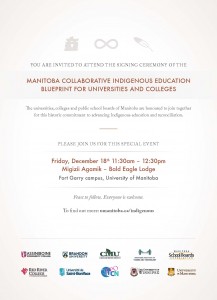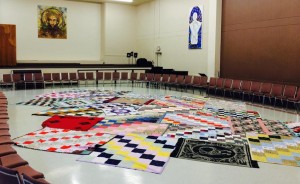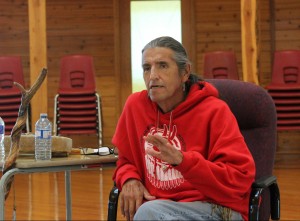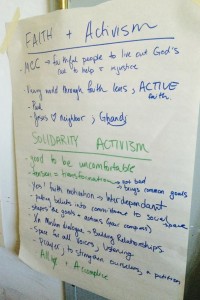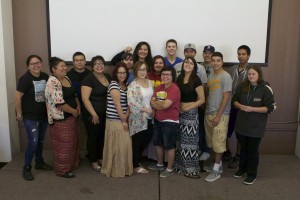Manitoba’s education sector units in effort to follow Truth and Reconciliation Commission recommendations
Canadian Mennonite University (CMU) joined five other Manitoba universities, three colleges, and the Manitoba School Boards Association in a landmark signing of the Indigenous Education Blueprint on December 18.
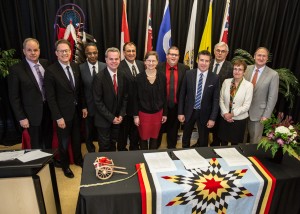
photo: University of Manitoba
Working together in unprecedented fashion, the participating institutions developed and are now committed to the plan, which acts upon the recommendations the Truth and Reconciliation Commission presented this past summer.
The Blueprint commits the participating institutions to concrete practices in order to respect, celebrate, and support Indigenous peoples, knowledge, and success.
“The story has always been told by someone else. Now it’s your turn, and today we honour that,” Elder Harry Bone said during his opening remarks at the signing ceremony.
Steven Heinrichs, Director of Indigenous Relations with Mennonite Church Canada, was in attendance to witness the signing.
“CMU took an amazing step today in the pursuit of right relations with host peoples,” Heinrichs said. “This isn’t only good for Indigenous peoples. It can help us settlers in the paths of decolonization and bring us life. I’m looking forward to seeing how CMU will grow into this.”
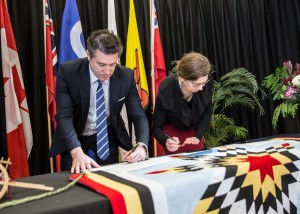
photo: University of Manitoba
CMU President Cheryl Pauls participated in the signing ceremony on behalf of the university.
She cites a number of events and initiatives, such as CMU’s partnership with the Peguis First Nation post-secondary transition program and hosting of community forums to discuss the possibilities of an urban reserve at the Kapyong Barracks, as examples where CMU has already cultivated Indigenous-settler relationships.
“We are proud to be a part of this historic commitment,” Pauls said. “CMU’s mission statement places significant importance on reconciliation in our church and society. Through education, reconciliation can be fostered, understood, and turned into a new reality.”
Moving ahead, there will be numerous all-faculty conversations at CMU to engage the Indigenous Education Blueprint.
These conversations will identify opportunities where programs and courses can be enlivened in light of the Blueprint, particularly within Peace and Conflict Studies at CMU’s Shaftesbury campus and Conflict Resolution Studies at the Menno Simons College campus in downtown Winnipeg.
In addition to CMU, the educational partners that signed the historic Blueprint include: University of Manitoba, University of Winnipeg, Brandon University, Université de Saint-Boniface, University College of the North, Red River College, Manitoba Institute of Trades and Technology, Assiniboine Community College, and Manitoba School Boards Association.
BY SIGNING THE INDIGENOUS EDUCATION BLUEPRINT, CMU and OTHER SIGNATORIES COMMIT TO:
- Engaging with Indigenous peoples in respectful and reciprocal relationships and to realize the right to self-determination, and to advance reconciliation, language and culture through education, research and skill development;
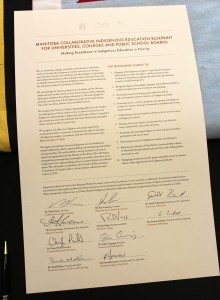 Bringing Indigenous knowledge, languages and intellectual traditions, models and approaches into curriculum and pedagogy;
Bringing Indigenous knowledge, languages and intellectual traditions, models and approaches into curriculum and pedagogy;- Promoting research and learning that reflects the history and contemporary context of the lives of Indigenous peoples;
- Increasing access to services, programs, and supports to Indigenous students, to ensure a learning environment is established that fosters learner success;
- Collaborating to increase student mobility to better serve the needs of Indigenous students;
- Building school and campus communities that are free of racism, value diversity and foster cultural safety;
- Increasing and measuring Indigenous school and post-secondary participation and success rates;
- Showcasing successes of Indigenous students and educators;
- Reflecting the diversity of First Nations, Inuit and Métis cultures in Manitoba through institutional governance and staffing policies and practices; and
- Engaging governments and the private and public sectors to increase labour market opportunities for Indigenous graduates.
Media coverage of December 18 signing:
Winnipeg Free Press, CBC, Globe and Mail, The Metro News, CJOB AM 680, The Brandon Sun
[youtube]https://youtu.be/grN4pnKDtA4[/youtube]
About CMU
A Christian university in the Anabaptist tradition, CMU’s Shaftesbury campus offers undergraduate degrees in arts, business, humanities, music, sciences, and social sciences, as well as graduate degrees in theology, ministry, peacebuilding and collaborative development, and an MBA. CMU has over 800 full-time equivalent students, including those enrolled in degree programs at the Shaftesbury and Menno Simons College campuses and in its Outtatown certificate program.
For information about CMU visit www.cmu.ca.
For additional information, please contact:
Kevin Kilbrei, Director of Communications & Marketing
kkilbrei@cmu.ca; 204.487.3300 Ext. 621
Canadian Mennonite University
500 Shaftesbury Blvd., Winnipeg, MB R3P 2N2

